IFRS Adoption: Comparing Australia and the UK's Experiences
VerifiedAdded on 2022/11/04
|5
|1058
|87
Report
AI Summary
This report critically examines the adoption of International Financial Reporting Standards (IFRS) in Australia and the United Kingdom. It highlights the similar objectives of both countries in adopting IFRS, such as enhancing comparability and credibility of financial information. However, it emphasizes the key differences in the adoption processes, with UK listed companies mandated by the EU and Australian entities directed by the Financial Reporting Council. The report delves into the extent of IFRS success in both countries, noting Australia's largely successful adoption compared to the UK, where convergence issues between IFRS and UK GAAP have limited comparability. The report concludes with recommendations for national accounting setting bodies, such as the Australian Accounting Standards Board (AASB), to address differences between national and international financial reporting systems, provide guidelines for adoption, and address challenges faced by entities in IFRS compliance. The report uses the provided references to support its findings.
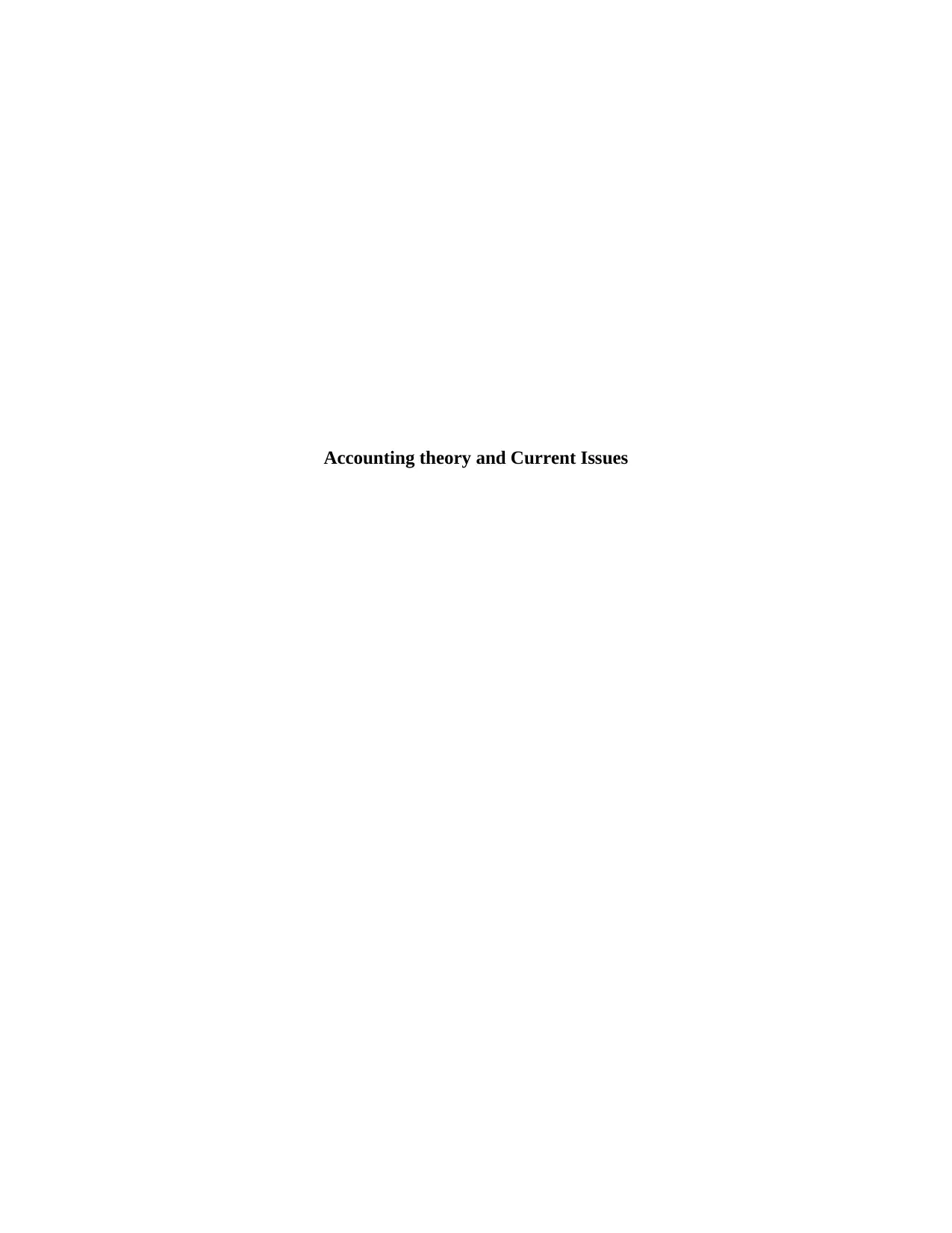
Accounting theory and Current Issues
Paraphrase This Document
Need a fresh take? Get an instant paraphrase of this document with our AI Paraphraser
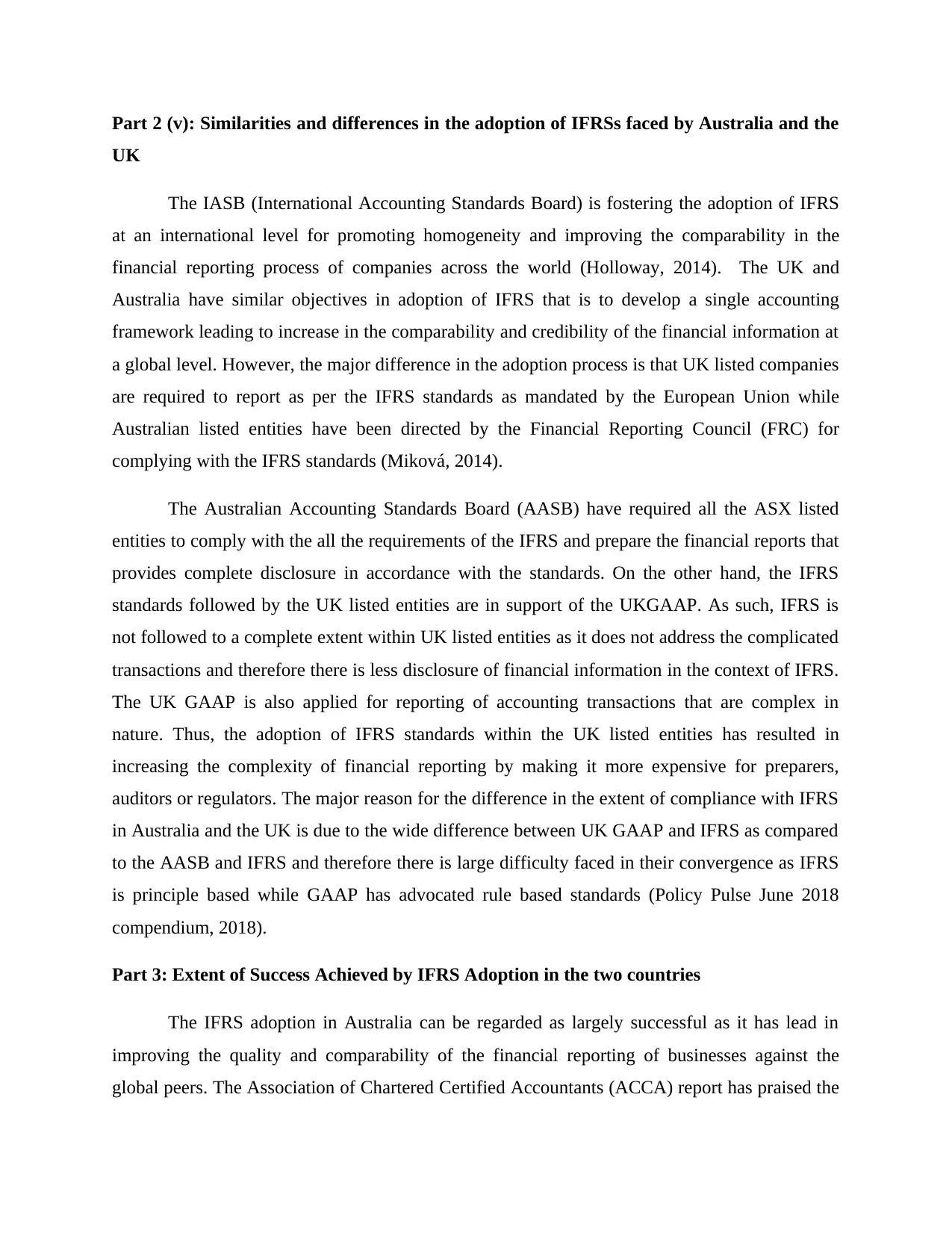
Part 2 (v): Similarities and differences in the adoption of IFRSs faced by Australia and the
UK
The IASB (International Accounting Standards Board) is fostering the adoption of IFRS
at an international level for promoting homogeneity and improving the comparability in the
financial reporting process of companies across the world (Holloway, 2014). The UK and
Australia have similar objectives in adoption of IFRS that is to develop a single accounting
framework leading to increase in the comparability and credibility of the financial information at
a global level. However, the major difference in the adoption process is that UK listed companies
are required to report as per the IFRS standards as mandated by the European Union while
Australian listed entities have been directed by the Financial Reporting Council (FRC) for
complying with the IFRS standards (Miková, 2014).
The Australian Accounting Standards Board (AASB) have required all the ASX listed
entities to comply with the all the requirements of the IFRS and prepare the financial reports that
provides complete disclosure in accordance with the standards. On the other hand, the IFRS
standards followed by the UK listed entities are in support of the UKGAAP. As such, IFRS is
not followed to a complete extent within UK listed entities as it does not address the complicated
transactions and therefore there is less disclosure of financial information in the context of IFRS.
The UK GAAP is also applied for reporting of accounting transactions that are complex in
nature. Thus, the adoption of IFRS standards within the UK listed entities has resulted in
increasing the complexity of financial reporting by making it more expensive for preparers,
auditors or regulators. The major reason for the difference in the extent of compliance with IFRS
in Australia and the UK is due to the wide difference between UK GAAP and IFRS as compared
to the AASB and IFRS and therefore there is large difficulty faced in their convergence as IFRS
is principle based while GAAP has advocated rule based standards (Policy Pulse June 2018
compendium, 2018).
Part 3: Extent of Success Achieved by IFRS Adoption in the two countries
The IFRS adoption in Australia can be regarded as largely successful as it has lead in
improving the quality and comparability of the financial reporting of businesses against the
global peers. The Association of Chartered Certified Accountants (ACCA) report has praised the
UK
The IASB (International Accounting Standards Board) is fostering the adoption of IFRS
at an international level for promoting homogeneity and improving the comparability in the
financial reporting process of companies across the world (Holloway, 2014). The UK and
Australia have similar objectives in adoption of IFRS that is to develop a single accounting
framework leading to increase in the comparability and credibility of the financial information at
a global level. However, the major difference in the adoption process is that UK listed companies
are required to report as per the IFRS standards as mandated by the European Union while
Australian listed entities have been directed by the Financial Reporting Council (FRC) for
complying with the IFRS standards (Miková, 2014).
The Australian Accounting Standards Board (AASB) have required all the ASX listed
entities to comply with the all the requirements of the IFRS and prepare the financial reports that
provides complete disclosure in accordance with the standards. On the other hand, the IFRS
standards followed by the UK listed entities are in support of the UKGAAP. As such, IFRS is
not followed to a complete extent within UK listed entities as it does not address the complicated
transactions and therefore there is less disclosure of financial information in the context of IFRS.
The UK GAAP is also applied for reporting of accounting transactions that are complex in
nature. Thus, the adoption of IFRS standards within the UK listed entities has resulted in
increasing the complexity of financial reporting by making it more expensive for preparers,
auditors or regulators. The major reason for the difference in the extent of compliance with IFRS
in Australia and the UK is due to the wide difference between UK GAAP and IFRS as compared
to the AASB and IFRS and therefore there is large difficulty faced in their convergence as IFRS
is principle based while GAAP has advocated rule based standards (Policy Pulse June 2018
compendium, 2018).
Part 3: Extent of Success Achieved by IFRS Adoption in the two countries
The IFRS adoption in Australia can be regarded as largely successful as it has lead in
improving the quality and comparability of the financial reporting of businesses against the
global peers. The Association of Chartered Certified Accountants (ACCA) report has praised the
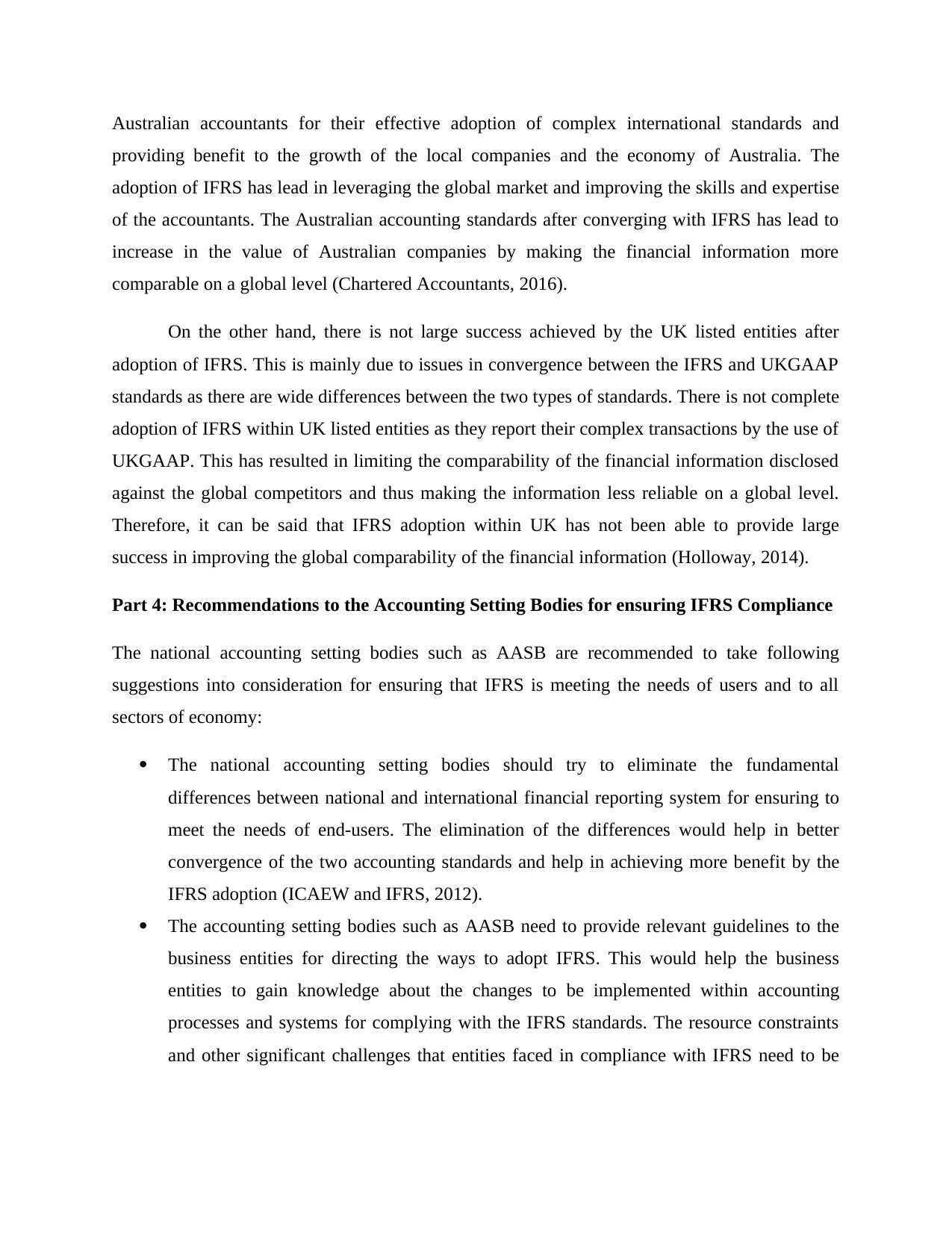
Australian accountants for their effective adoption of complex international standards and
providing benefit to the growth of the local companies and the economy of Australia. The
adoption of IFRS has lead in leveraging the global market and improving the skills and expertise
of the accountants. The Australian accounting standards after converging with IFRS has lead to
increase in the value of Australian companies by making the financial information more
comparable on a global level (Chartered Accountants, 2016).
On the other hand, there is not large success achieved by the UK listed entities after
adoption of IFRS. This is mainly due to issues in convergence between the IFRS and UKGAAP
standards as there are wide differences between the two types of standards. There is not complete
adoption of IFRS within UK listed entities as they report their complex transactions by the use of
UKGAAP. This has resulted in limiting the comparability of the financial information disclosed
against the global competitors and thus making the information less reliable on a global level.
Therefore, it can be said that IFRS adoption within UK has not been able to provide large
success in improving the global comparability of the financial information (Holloway, 2014).
Part 4: Recommendations to the Accounting Setting Bodies for ensuring IFRS Compliance
The national accounting setting bodies such as AASB are recommended to take following
suggestions into consideration for ensuring that IFRS is meeting the needs of users and to all
sectors of economy:
The national accounting setting bodies should try to eliminate the fundamental
differences between national and international financial reporting system for ensuring to
meet the needs of end-users. The elimination of the differences would help in better
convergence of the two accounting standards and help in achieving more benefit by the
IFRS adoption (ICAEW and IFRS, 2012).
The accounting setting bodies such as AASB need to provide relevant guidelines to the
business entities for directing the ways to adopt IFRS. This would help the business
entities to gain knowledge about the changes to be implemented within accounting
processes and systems for complying with the IFRS standards. The resource constraints
and other significant challenges that entities faced in compliance with IFRS need to be
providing benefit to the growth of the local companies and the economy of Australia. The
adoption of IFRS has lead in leveraging the global market and improving the skills and expertise
of the accountants. The Australian accounting standards after converging with IFRS has lead to
increase in the value of Australian companies by making the financial information more
comparable on a global level (Chartered Accountants, 2016).
On the other hand, there is not large success achieved by the UK listed entities after
adoption of IFRS. This is mainly due to issues in convergence between the IFRS and UKGAAP
standards as there are wide differences between the two types of standards. There is not complete
adoption of IFRS within UK listed entities as they report their complex transactions by the use of
UKGAAP. This has resulted in limiting the comparability of the financial information disclosed
against the global competitors and thus making the information less reliable on a global level.
Therefore, it can be said that IFRS adoption within UK has not been able to provide large
success in improving the global comparability of the financial information (Holloway, 2014).
Part 4: Recommendations to the Accounting Setting Bodies for ensuring IFRS Compliance
The national accounting setting bodies such as AASB are recommended to take following
suggestions into consideration for ensuring that IFRS is meeting the needs of users and to all
sectors of economy:
The national accounting setting bodies should try to eliminate the fundamental
differences between national and international financial reporting system for ensuring to
meet the needs of end-users. The elimination of the differences would help in better
convergence of the two accounting standards and help in achieving more benefit by the
IFRS adoption (ICAEW and IFRS, 2012).
The accounting setting bodies such as AASB need to provide relevant guidelines to the
business entities for directing the ways to adopt IFRS. This would help the business
entities to gain knowledge about the changes to be implemented within accounting
processes and systems for complying with the IFRS standards. The resource constraints
and other significant challenges that entities faced in compliance with IFRS need to be
⊘ This is a preview!⊘
Do you want full access?
Subscribe today to unlock all pages.

Trusted by 1+ million students worldwide
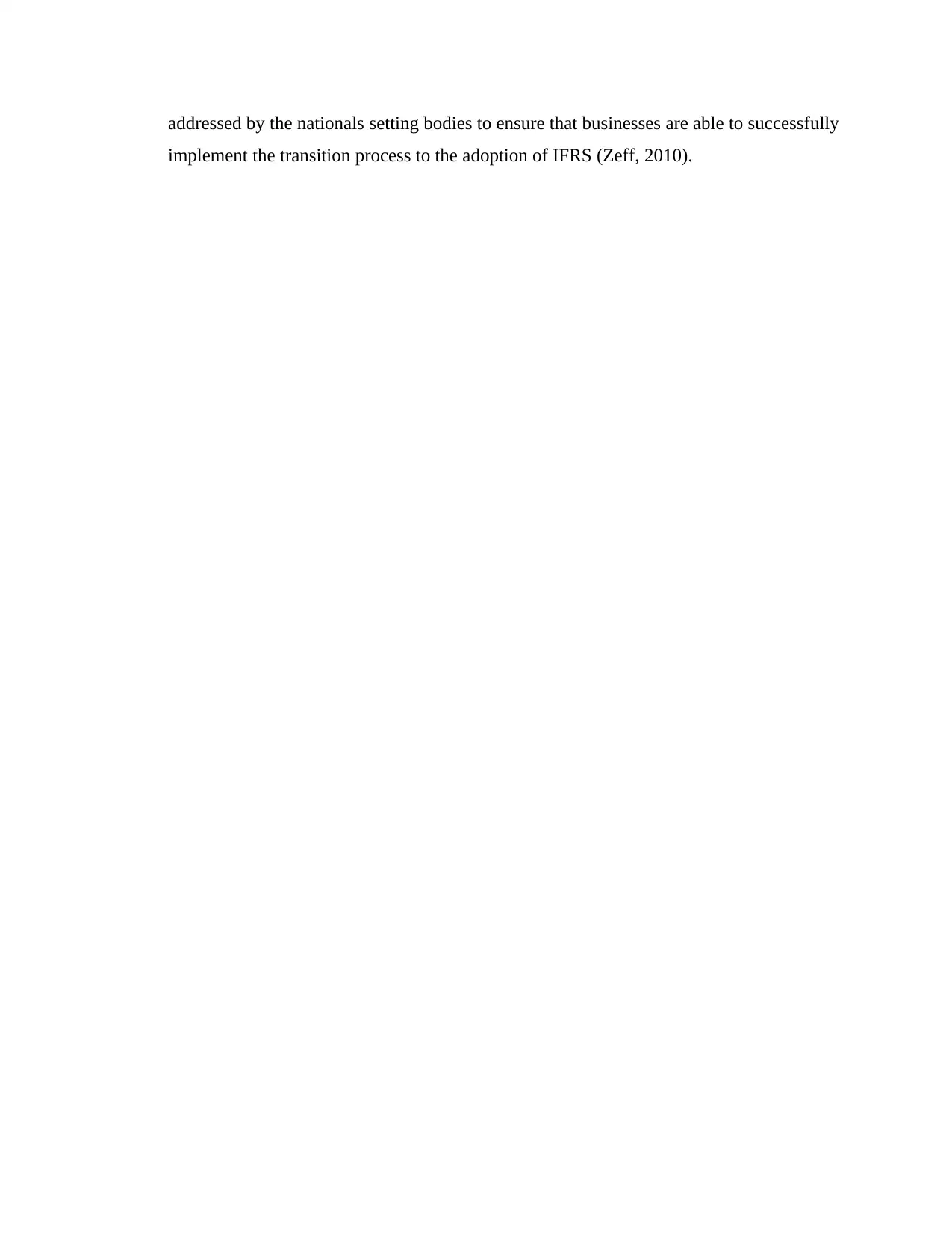
addressed by the nationals setting bodies to ensure that businesses are able to successfully
implement the transition process to the adoption of IFRS (Zeff, 2010).
implement the transition process to the adoption of IFRS (Zeff, 2010).
Paraphrase This Document
Need a fresh take? Get an instant paraphrase of this document with our AI Paraphraser
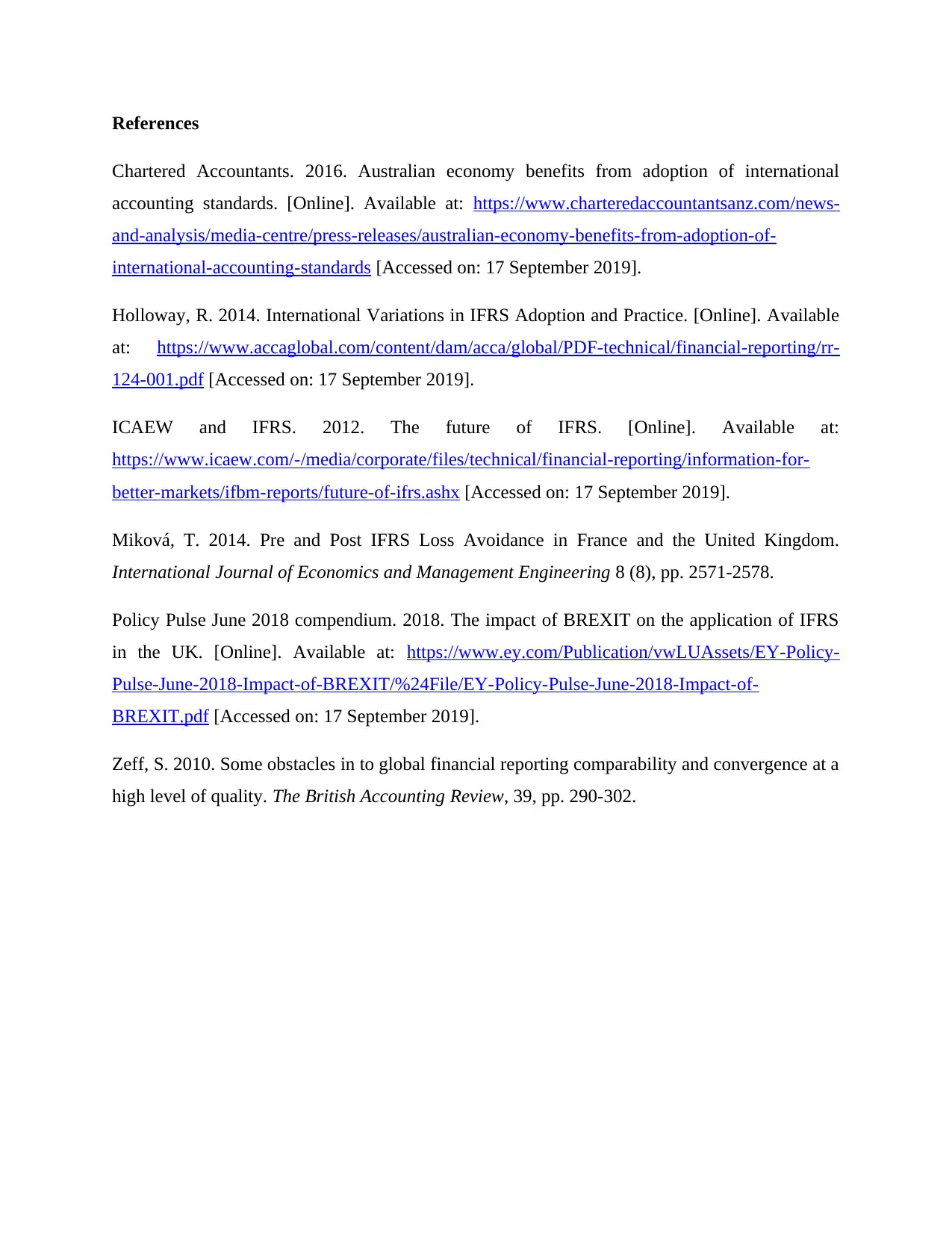
References
Chartered Accountants. 2016. Australian economy benefits from adoption of international
accounting standards. [Online]. Available at: https://www.charteredaccountantsanz.com/news-
and-analysis/media-centre/press-releases/australian-economy-benefits-from-adoption-of-
international-accounting-standards [Accessed on: 17 September 2019].
Holloway, R. 2014. International Variations in IFRS Adoption and Practice. [Online]. Available
at: https://www.accaglobal.com/content/dam/acca/global/PDF-technical/financial-reporting/rr-
124-001.pdf [Accessed on: 17 September 2019].
ICAEW and IFRS. 2012. The future of IFRS. [Online]. Available at:
https://www.icaew.com/-/media/corporate/files/technical/financial-reporting/information-for-
better-markets/ifbm-reports/future-of-ifrs.ashx [Accessed on: 17 September 2019].
Miková, T. 2014. Pre and Post IFRS Loss Avoidance in France and the United Kingdom.
International Journal of Economics and Management Engineering 8 (8), pp. 2571-2578.
Policy Pulse June 2018 compendium. 2018. The impact of BREXIT on the application of IFRS
in the UK. [Online]. Available at: https://www.ey.com/Publication/vwLUAssets/EY-Policy-
Pulse-June-2018-Impact-of-BREXIT/%24File/EY-Policy-Pulse-June-2018-Impact-of-
BREXIT.pdf [Accessed on: 17 September 2019].
Zeff, S. 2010. Some obstacles in to global financial reporting comparability and convergence at a
high level of quality. The British Accounting Review, 39, pp. 290-302.
Chartered Accountants. 2016. Australian economy benefits from adoption of international
accounting standards. [Online]. Available at: https://www.charteredaccountantsanz.com/news-
and-analysis/media-centre/press-releases/australian-economy-benefits-from-adoption-of-
international-accounting-standards [Accessed on: 17 September 2019].
Holloway, R. 2014. International Variations in IFRS Adoption and Practice. [Online]. Available
at: https://www.accaglobal.com/content/dam/acca/global/PDF-technical/financial-reporting/rr-
124-001.pdf [Accessed on: 17 September 2019].
ICAEW and IFRS. 2012. The future of IFRS. [Online]. Available at:
https://www.icaew.com/-/media/corporate/files/technical/financial-reporting/information-for-
better-markets/ifbm-reports/future-of-ifrs.ashx [Accessed on: 17 September 2019].
Miková, T. 2014. Pre and Post IFRS Loss Avoidance in France and the United Kingdom.
International Journal of Economics and Management Engineering 8 (8), pp. 2571-2578.
Policy Pulse June 2018 compendium. 2018. The impact of BREXIT on the application of IFRS
in the UK. [Online]. Available at: https://www.ey.com/Publication/vwLUAssets/EY-Policy-
Pulse-June-2018-Impact-of-BREXIT/%24File/EY-Policy-Pulse-June-2018-Impact-of-
BREXIT.pdf [Accessed on: 17 September 2019].
Zeff, S. 2010. Some obstacles in to global financial reporting comparability and convergence at a
high level of quality. The British Accounting Review, 39, pp. 290-302.
1 out of 5
Related Documents
Your All-in-One AI-Powered Toolkit for Academic Success.
+13062052269
info@desklib.com
Available 24*7 on WhatsApp / Email
![[object Object]](/_next/static/media/star-bottom.7253800d.svg)
Unlock your academic potential
Copyright © 2020–2026 A2Z Services. All Rights Reserved. Developed and managed by ZUCOL.




